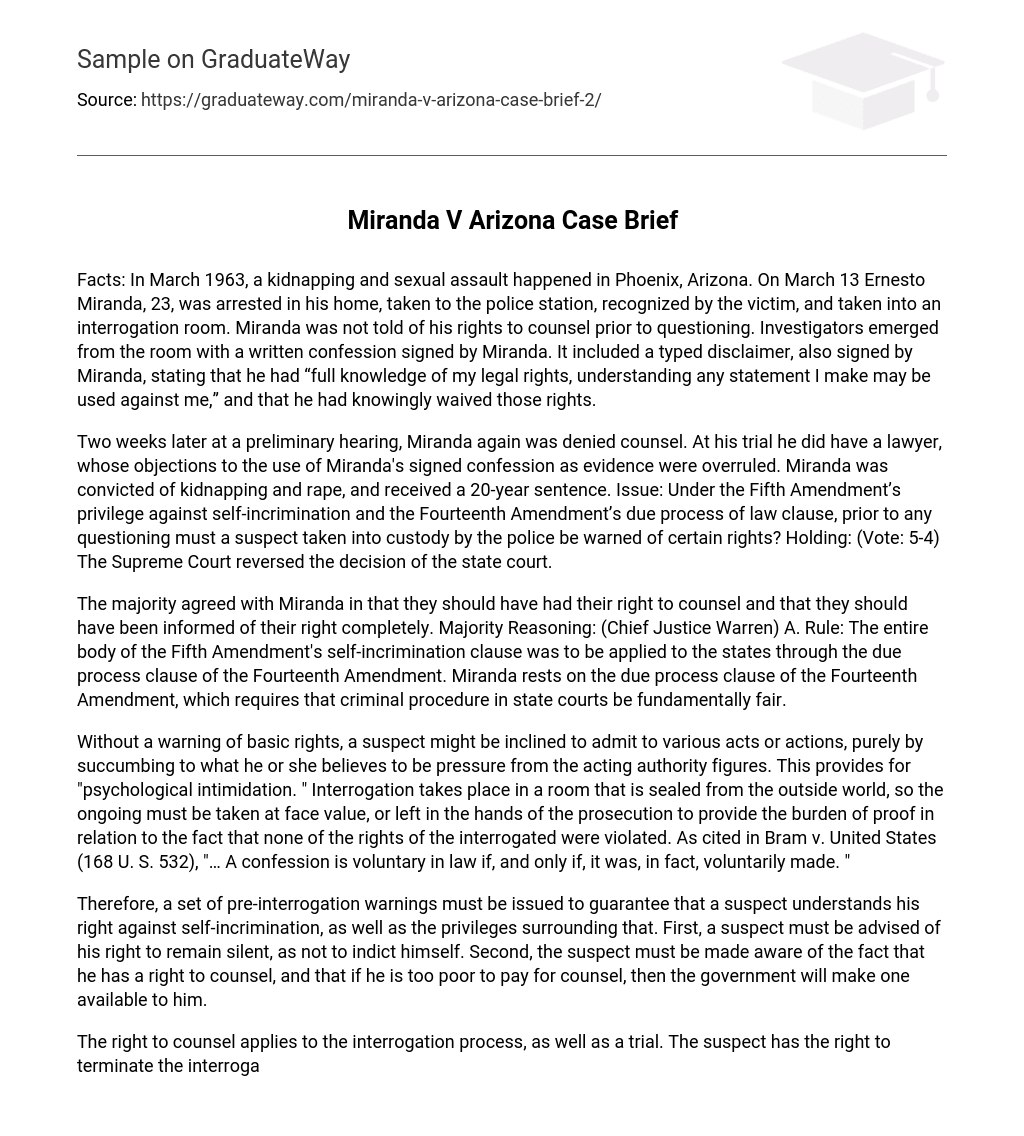In March 1963, Ernesto Miranda was arrested at his home in Phoenix, Arizona for a kidnapping and sexual assault incident. He was taken to an interrogation room where he was not informed of his right to have legal representation present. The police questioned him and presented a written confession that Miranda had signed, which included a disclaimer acknowledging his knowledge of his legal rights, understanding of the potential consequences of using his statements against him in court, and voluntary waiver of these rights.
Two weeks later, Miranda once again faced the denial of counsel during a preliminary hearing. However, he did have legal representation when his trial took place. Despite objections from the lawyer regarding the use of Miranda’s signed confession as evidence, these objections were disregarded. Consequently, Miranda was convicted of kidnapping and rape and sentenced to 20 years in prison. The main issue revolves around whether individuals taken into custody should be informed of their specific rights before any questioning occurs, as mandated by the self-incrimination privilege stated in the Fifth Amendment and the due process clause outlined in the Fourteenth Amendment. Ultimately, with a slim margin of 5-4 votes, the Supreme Court overturned the decision made by the state court.
The majority, headed by Chief Justice Warren, agreed with Miranda’s belief that they should have been given proper legal representation and fully informed about their rights. The majority opinion emphasized that the Fifth Amendment’s protection against self-incrimination should be extended to the states through the Fourteenth Amendment’s due process clause. Miranda contended that state courts must adhere to a just criminal procedure as mandated by the Fourteenth Amendment.
A suspect, lacking knowledge of their basic rights, may be coerced into confessing to certain acts or actions solely due to perceived pressure from figures in authority. This results in the establishment of an atmosphere characterized by “psychological intimidation.” The interrogations take place within a sealed room, isolating the suspect from any external influence; thus, any information provided during questioning is either accepted without question or necessitates the prosecution’s demonstration that none of the suspect’s rights were violated. Bram v. United States (168 U.S. 532) explicates this concept, affirming that a confession can only be deemed voluntary under legal terms if it was genuinely given willingly.
To guarantee the suspect comprehends their right against self-incrimination and the accompanying privileges, it is essential to issue a set of pre-interrogation advisories. Initially, notify the suspect about their prerogative to refrain from responding to inquiries in order to evade self-implication. Moreover, ensure they understand their entitlement to legal counsel and that if they lack funds, the government will assign one for them.
The right to legal representation is applicable both during questioning and at trial, and the suspect has the option to stop the interrogation at any time. It is the government’s responsibility to prove that a confession obtained without a lawyer present was not coerced in any way that would violate the defendant’s rights. Chief Justice Warren emphasized the significance of safeguarding the Fifth Amendment right against self-incrimination and ensuring that only voluntary statements made by the defendant are admissible in court. He also stressed that it is the State’s duty to demonstrate that proper procedural safeguards were followed to uphold this privilege and evaluate the case based on established standards of “fundamental fairness.” Additionally, before conducting any custodial questioning, specific warnings have been mandated by the court.
This warning serves as a notice to the accused about their Miranda rights, including the right to remain silent and the potential use of their statements in court. It also informs them of their entitlement to legal representation and access to an attorney, regardless of financial means. Additionally, it affirms that the suspect can choose to terminate the interrogation at any point. Chief Justice Warren issued this ruling.
Harlan (joined by Stewart and White) dissented, arguing that the admissibility of Miranda’s confession was supported by precedent. Furthermore, they believed that Miranda’s brief interrogation served a legitimate purpose, lacked perceptible unfairness, and posed little risk of injustice. They contended that the new protections would significantly undermine law enforcement efforts and asserted that the Fifth Amendment did not prohibit law officers from interrogating a suspect in custody.
Dissent 2: Clark The Court should have continued to accept the totality of the circumstances test for determining whether a defendant’s statements or confession were ade voluntarily. Clark concluded that only the defendant whose conviction was upheld gave a confession that was not voluntary. Irons, Peter H. “A Better Place Because He Lived” A People’s History of the Supreme Court. New York: Viking, 1999. 409-420. Print. “Miranda v. Arizona: An Overview and Discussion Questions. ” USCOURTSGOV RSS. The U. S. Courts, The Federal Judiciary, June 2011. Web. 02 Dec. 2012.





